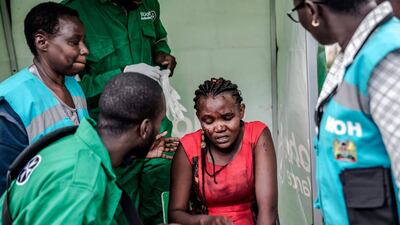Word of an attack first spread through Twitter, as it so often does.
“Does anyone know what's happening in Riverside? There's been an explosion and what sounds like gunshots.”
“14 Riverside is under attack. There are gunshots and explosions.”
Citizen TV Kenya arrived on the scene and started streaming. Soon most of Nairobi knew that gunmen had blasted their way through security and detonated a suicide bomb in the lobby of the upscale DusitD2 hotel at 14 Riverside Drive, a complex that also houses a cluster of businesses including banks, restaurants and retail establishments. Friends and loved ones of those trapped inside gathered anxiously at the police perimeter, glued to their phones as periodic gunshots and blasts echoed from within.
The name “Al Shabab” was on everyone’s lips long before the terror group claimed responsibility.
The next 24 hours felt familiar for anyone who had lived through the Westgate Mall attack in 2013 or the Garissa University massacre of 2015. Ambulances screamed toward Kenyatta Hospital. The Inspector General went on television to assure citizens that an operation was well underway to secure the area and that they were “mopping up” – only for gunfire to continue well into the dawn. Residents lined up to donate blood. Devastated families arrived at Chiromo Mortuary to identify the bodies.
The official death toll climbed from one to 14. President Uhuru Kenyatta addressed the nation on Wednesday morning, said all of the terrorists had been eliminated, praised the “quick and effective response,” and vowed justice.
“We will seek out every single person that was involved in the funding, planning and execution of the heinous act,” he said. “We will pursue them relentlessly wherever they will be until they are held to account.”
A security and policy analyst who specialises in the Horn of Africa, Abdullahi Boru Halakhe, said this type of rhetoric avoids addressing a central question: Why Kenya is being attacked in the first place.
“Every time these attacks pop up you’ll hear the president and the whole government machinery saying the usual stuff,” he said. “‘Hey look, it’s over, we’ve been tested, we’ll come back stronger,’ yadda yadda yadda.”
“But from a policy perspective, as long as we are inside Somalia, Kenyans will continue to be attacked.”
Kenya has had troops in Somalia since 2011, an intervention that marked the beginning of a series of retaliatory attacks. Riverside comes three years to the day after a massive Al Shabab assault on Kenya Defense Forces (KDF) in El Adde, Somalia resulted in the deaths of at least 141 Kenyan soldiers, according to a CNN investigation.
Kenyan forces are in the Horn of Africa nation as part of the African Union Mission in Somalia (AMISOM), a peacekeeping mission that supports the Somali Army in their fight against Al Shabab militants. Al Shabab’s strength has eroded in recent years, but the fight drags on, and in the last couple of years the United States has ramped up a shadow war of drone strikes and special forces operations.
According to Mr Halakhe, it’s no longer clear what the rationale is for Kenya’s presence in the country.
“Kenyans were the secondary targets until after Kenya intervened in Somalia,” he said. “But you’ll hardly hear in any policy discussions, ‘What does success look like? How long are we going to stay? When are we leaving?’”
Famed Kenyan activist Boniface Mwangi took to Twitter on Wednesday to call for Kenya to remove its troops from Somalia.
“President Kenyatta it's time you bring our troops home,” he tweeted. “Every other month our soldiers and police are killed by terrorists in Lamu, it never makes the headlines though. We have no business in #Somalia, let's secure #Kenya.”
Since Westgate, security at malls and other high-profile soft targets in Nairobi has been increased significantly. Compounds encircled by walls are only accessible at gates where vehicles are searched before they enter. Metal detectors are highly visible at every pedestrian entrance.
The DusitD2 hotel had security that ranked among the best in Nairobi, but metal detectors can do little against combatants armed with AK-47 assault rifles and suicide vests—not to mention a porous, 682-kilometre border with Somalia where armed militants can easily bribe their way in.
Mr Halakhe says the relatively quick and coordinated interagency response to the Riverside Attack shows that Kenya has learned some lessons from Westgate and Garissa, which were both criticised for the delayed arrival of the elite General Service Unit squad.
“This one was really quick,” he said. “The interagency coordination needs to be applauded. My worry is guided by the history of how the state has continued to respond in the past. It can only be great with successful prosecutions: a very judicious, tenacious collection of evidence. That is the next phase.”
________________
Read more
Kenya attack: Al Shabab claims assault on Nairobi hotel complex
Nairobi attack survivor's escape: We were focused on getting out alive
Nairobi attack shows Al Shabab still powerful despite US efforts

